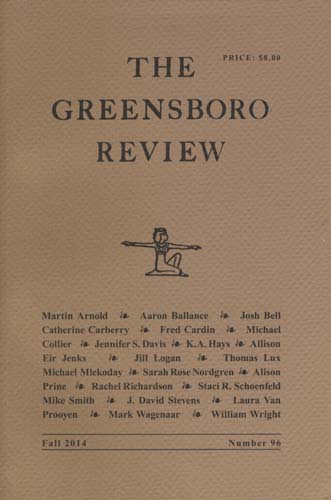The Greensboro Review – Fall 2014
The work in this issue (four short stories and eighteen poems) is representative of the highly competent writing that has been the hallmark of The Greensboro Review for some forty years. Most of the works, as is usual with university-sponsored journals, are by writers studying or teaching in MFA programs, or graduates of such programs. Most contributors have solid writing credentials. The work in this issue (four short stories and eighteen poems) is representative of the highly competent writing that has been the hallmark of The Greensboro Review for some forty years. Most of the works, as is usual with university-sponsored journals, are by writers studying or teaching in MFA programs, or graduates of such programs. Most contributors have solid writing credentials.
Among the poems, Thomas Lux’s “History Island” stands out for the wit of its extended metaphor, “None of us go there anymore. / It’s a defunct resort / town in winter” he begins, but it’s our island and by the end, we understand that it won’t be so easy to find a way off or to escape the eight-foot bucksaw leaning against a wall.
Alison Prine, in her poem, “Rearview Mirror: January,” beginning, “My heart started beating inside you,” delicately muses on a mother’s death in a car wreck which the baby survived, without articulating death, wreck, car, or baby, and without telling the story. All is suggested by scraps of memories that bring back the tragedy to the adult narrator:
It comes back like the sound
of those old rotary phones—
the one choking ring they make
when they’re slammed against the floor.
The keeper poem is the winner of the Amon Liner Poetry Award, “Mischa and the Grave” by Aaron Ballance. Unfolding slowly, like a bloody handkerchief that has been crumpled into a ball, it tells of an “ancient Paso Fino” who somehow understands he is going to be put down, and so stands quietly all day beside the fresh-dug grave next to which he will be shot:
[ . . . ] a hole
we had left open to sun
in case that warmth
touched him when he fell.
“Orbital Debris,” a long short story by Jennifer S. Davis, takes its central metaphor from Vivek, an odd-looking boy who spends hours searching a field, supposedly for space junk. His orbit intersects that of Addie, an ailing widow who watches him from her house. Vivek is essentially the caregiver for his mother, a divorced nurse who cannot get past the death of her first son in a car wreck when he was a teenager. Vivek is really looking for his late brother’s class ring, which he borrowed from his mother’s jewelry box and lost. Eventually his orbit will overlap sadly with that of the brother’s girlfriend Lila, who was also in the wreck and has made bad choices ever since. Addie’s path also, tragically, crosses that of Jacob, a laid-off teacher doing Goodwill pickups, which gives him the chance to case her house and ease his financial difficulties. Connections are fleeting and sometimes disastrous, as we travel alone.
The early pages of Jill Logan’s story “Touching Down,” are printed in three columns, one for Dr. Holden, his daughter Katie, and their cat Miss Tibbs, returning to New York from a trip to the Grand Canyon; one for Nana and her two grandsons Bart and Caleb, who have been visiting the oldest grandson in prison; and one for Waymon and Violet, a long-married trucker couple in an eighteen-wheeler. When a tornado roars towards the highway they are on, they all shelter in Woody’s Kash and Karry gas station with station attendant Hinton. In the station, the print returns to the standard page format. A hawk observing from a distance may represent both author and reader. Again, fleeting connections may or may not make a difference to the players.
In J. David Stevens’s “Remuneration,” Penelope’s beloved bichon, Siena Blue, is allegedly eaten by an alligator on husband Dale’s watch. In this funny-sad story, a man named Pearsall shows up with a live alligator that is the supposed culprit, asking for a reward. Penelope guesses the dog met some other fate and that Dale is fooling around. She feels, “One of them must be called to account, Dale or the lizard.” At the end, we understand how little we can protect ourselves from ourselves.
“Anatomy of Same-Hearted Animals,” by Catherine Carberry, resonates with “Remuneration.” Tessa takes a job assisting a rural veterinarian. She is to live with the obviously predatory doctor and his knowing wife and help with their farm animals as well. Tessa is fleeing medical school and her sister Katie, who cannot recover psychologically from a miscarriage. Tessa’s need to punish herself is graphically illustrated when she cuts out the heart of an infected sheep, fries it up with mushrooms and celery, and eats it.
Continuing its forty-year tradition of powerful writing, this issue of The Greensboro Review is a remarkably even collection of poetry and fiction about the American scene and alienation.
[www.tgronline.net]





